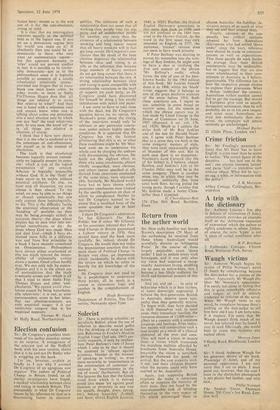Election confusion
Sir: Dr Cosgrave's graceless treat- ment of his earlier mistakes comes as no surprise. A comparison of the relevant text of the Nuffield book with his own version, shows that it is he and not Dr Butler who is wriggling on the hook.
Let -me, however, explain as briefly as I can why I accused Dr Cosgrave of an egregious non sequitur. The author of Political Change in Britain fournd, as all similar investigators have found, a marked relationship between class and voting in modern Britain. This presumably is what Dr Cosgrave means by his reference to class as a determining factor in electoral
politics. The existence of such a relationship does not mean that all working-class people vote for one party and all middle-class people for another, any more than the existence of a relationship between smoking and lung cancer means that all heavy smokers will in fact get lung cancer. Dr Cosgrave's con- clusion that the result of the June election disproves the relationship between class and voting is as silly as the inference that because large numbers of heavy smokers do not get lung cancer that there is no relationship between the two. A strong relationship between class and voting is quite compatible with considerable variations in the level of support for each party, as Dr Cosgrave could have discovered for himself by doing a few simple calculations with pencil and paper.
I am sorry to have to take issue with the dead, but Dr Cosgrave's question leaves me no option. Mr Macleod's point about the timing of the interviews would only be relevant to any particular conclu- sion under certain highly specific conditions. It is apparent that Dr Cosgrave has not the faintest glimmering that this is so, or what these conditions might be. Mr Mac- leod went on to undermine his whole case by charging the authors with documenting the obvious, He made not the slightest effort to show why some conclusions, almost wholly unspecified, were obvious, and others (never specified at all) derived from interviews conducted at the same times, were unaccept- able. Similarly, Mr Macleod would have had to have shown which particular conclusions were vitiated by the specific question on class of which he complained. Neither he nor Dr Cosgrave seemed to be aware that a modified form of the same question was put in later interviews.
I share Dr Cosgrave's admiration for Ian Gilmour's The Body Politic, but if either Mr Gilmour or his associates inferred that Poli- tical Change in Britain guaranteed a Labour victory in 1970, they should have read the book more carefully. So, indeed, should Dr Cosgrave. He would then not make the preposterous assertion that the main thesis of Political Change in Britain was class, an impression which, incidentally, he shares with the review on which he relies so heavily for his knowledge of the book.
Dr Cosgrave does not need to be a psephologist to understand these points; all he needs is a course in elementary logic and another in the comprehension of English. Hugh Herrington Department of Politics, The Uni- versity, Newcastle upon Tyne


































 Previous page
Previous page